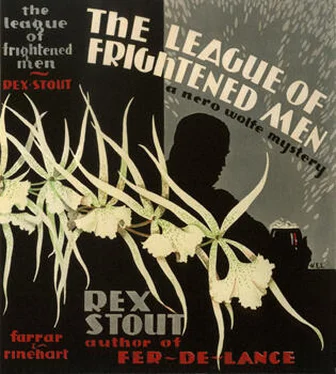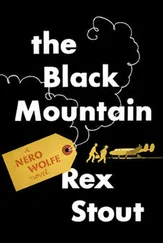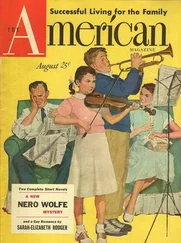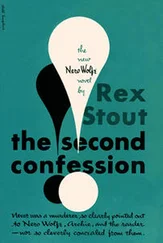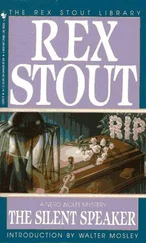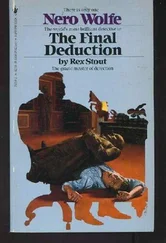The cripple leaned there, bending forward, looking Wolfe in the eyes. His chin was stuck out. All of a sudden he began to laugh. It was a hell of a laugh, I thought it was going to choke him. He went on with it. Then it petered out and he turned around and got hold of his stick. He seemed to me about half hysterical, and I was ready to jump him if he tried any child’s play like bouncing the stick on Wolfe’s bean, but I had him wrong again. He got into his regular posture, leaning to the right side with his head a little to the left to even up, and from his light-colored eyes steady on Wolfe again you would never have guessed he had any sentiments at all.
Wolfe said, “The next time you come here, Mr. Chapin, you may take the box with you.”
Chapin shook his head. His tone was new, sharper: “I think not. You’re making a mistake. You’re forgetting that I’ve had twenty years’ practice at renunciation.”
Wolfe shook his head. “Oh no. On the contrary, that’s what I’m counting on. The only question will be, which of two sacrifices you will select. If I know you, and I think I do, I know where your choice will lie.”
“I’ll make it now.” I stared at the cripple’s incredible smile; I thought to myself that in order to break him Wolfe would have to wipe that smile off, and it didn’t look practical by any means I’d ever heard of. With the smile still working, fixed, Chapin put his left hand on the desk to steady himself, and with his right hand he lifted his stick up, pointing it in front of him like a rapier, and gently let its tip come to rest on the surface of the desk. He slid the tip along until it was against the side of the box, and then pushed, not in a hurry, just a steady push. The box moved, approached the edge, kept going, and tumbled to the floor. It bounced a little and rolled towards my feet.
Chapin retrieved his stick and got his weight on it again. He didn’t look at the box; he directed his smile at Wolfe. “I told you, sir, I had learned to live on pity. I am learning now to live without it.”
He tossed his head up, twice, like a horse on the rein, got himself turned around, and hobbled to the door and on out. I sat and watched him; I didn’t go to the hall to help him. We heard him out there, shuffling to keep his balance as he got into his coat. Then the outer door opening and closing.
Wolfe sighed. “Pick it up, Archie. Put it away. It is astonishing, the effect a little literary and financial success will produce on a spiritual ailment.”
He rang for beer.
I didn’t go out again that morning. Wolfe got loquacious. Leaning back with his fingers interlaced in front of his belly, with his eyes mostly shut, he favored me with one of his quiet endless orations, his subject this time being what he called bravado of the psyche. He said there were two distinct species of bravado: one having as its purpose to impress outside spectators, the other being calculated solely for an internal audience. The latter was bravado of the psyche. It was a show put on by this or that factor of the ego to make a hit with all the other factors. And so on. I did manage, before one o’clock, to make a copy of the first warning on the Harvard Club junk, and put it under the glass. It was it. Chapin had typed his poems of friendship on that machine.
After lunch I got in the roadster to hunt for Hibbard. The usual reports had come from the boys, including Saul Panzer: nothing. Fred Durkin had cackled over the phone, at a quarter to one, that he and his colleagues had made a swell procession following Paul Chapin to Nero Wolfe’s house, and had retired around the corner, to Tenth Avenue, to await news of Wolfe’s demise. Then they had trailed Chapin back home again.
I had about as much hope of finding Hibbard as of getting a mash note from Greta Garbo, but I went on poking around. Of course I was phoning his niece, Evelyn, twice a day, not in the expectation of getting any dope, since she would let us know if she got any kind of news, but because she was my client and you’ve got to keep reminding your clients you’re on the job. She was beginning to sound pretty sick on the telephone, and I hardly had the heart to try to buck her up, but I made a few passes at it.
Among other weak stabs I made that Friday afternoon was a visit to the office of Ferdinand Bowen the stockbroker. Hibbard had an account with Galbraith & Bowen that had been fairly active fooling with bonds, not much margin stuff, and while I more or less took Bowen in my stride, calling on all the members of the league, there was a little more chance of a hint there than with the others. Entering the office on the twentieth floor of one of the Wall Street buildings, I told myself I’d better advise Wolfe to give a boost to Bowen’s contribution to the pot, no matter what the bank report said. Surely they had the rent paid, and that alone must have been beyond the dreams of avarice. It was one of those layouts, a whole floor, that give you the feeling that a girl would have to be at least a duchess to get a job there as a stenographer.
I was taken into Bowen’s own room. It was as big as a dance hall, and the rugs made you want to walk around them. Bowen sat behind a beautiful dark-brown desk with nothing on it but the Wall Street Journal and an ash tray. One of his little hands held a long fat cigarette with smoke curling up from it that smelled like a Turkish harlot — at least it smelled like what I would expect if I ever got close to one. I didn’t like that guy. If I’d had my choice of pinning a murder on him or Paul Chapin, I’d have been compelled to toss a coin.
He thought he was being decent when he grunted to me to sit down. I can stand a real tough baby, but a bird that fancies himself for a hot mixture of John D. Rockefeller and Lord Chesterfield, being all the time innocent of both ingredients, gives me a severe pain in the sitter. I told him what I was telling all of them, that I would like to know about the last time he had seen Andrew Hibbard, and all details. He had to think. Finally he decided the last time had been more than a week before Hibbard disappeared, around the twentieth of October, at the theater. It had been a party, Hibbard with his niece and Bowen with his wife. Nothing of any significance had been said, Bowen declared, nothing with any bearing on the present situation. As he remembered it, there had been no mention of Paul Chapin, probably because Bowen had been one of the three who had hired the Bascom detectives, and Hibbard disapproved of it and didn’t want to spoil the evening with an argument.
I asked him, “Hibbard had a trading account with your firm?”
He nodded. “For a long while, over ten years. It wasn’t very active, mostly back and forth in bonds.”
“Yeah. I gathered that from the statements among his papers. You see, one thing that might help would be any evidence that when Hibbard left his apartment that Tuesday evening he had an idea that he might not be back again. I can’t find any. I’m still looking. For instance, during the few days preceding his disappearance, did he make any unusual arrangements or give any unusual orders regarding his account here?”
Bowen shook the round thing that he used to grow his hair on. “No. I would have been told... but I’ll make sure.” From a row on the wall behind him he pulled out a telephone, and talked into it. He waited a while, and talked some more. He pushed the phone back, and turned to me. “No, as I thought. There has been no transaction on Andy’s account for over two weeks, and there were no instructions from him.”
I bade him farewell.
That was a good sample of the steady progress I made that day in the search for Andrew Hibbard. It was a triumph. I found out as much from the other six guys I saw as I did from Ferdinand Bowen, so I was all elated when I breezed in home around dinner time, not to mention the fact that with the roadster parked on Ninetieth Street some dirty lout scraped the rear fender while I was in seeing Dr. Burton. I didn’t feel like anything at all, not even like listening to the charming gusto of Wolfe’s dinner conversation — during a meal he refused to remember that there was such a thing as a murder case in the world — so I was glad that he picked that evening to leave the radio turned on.
Читать дальше
